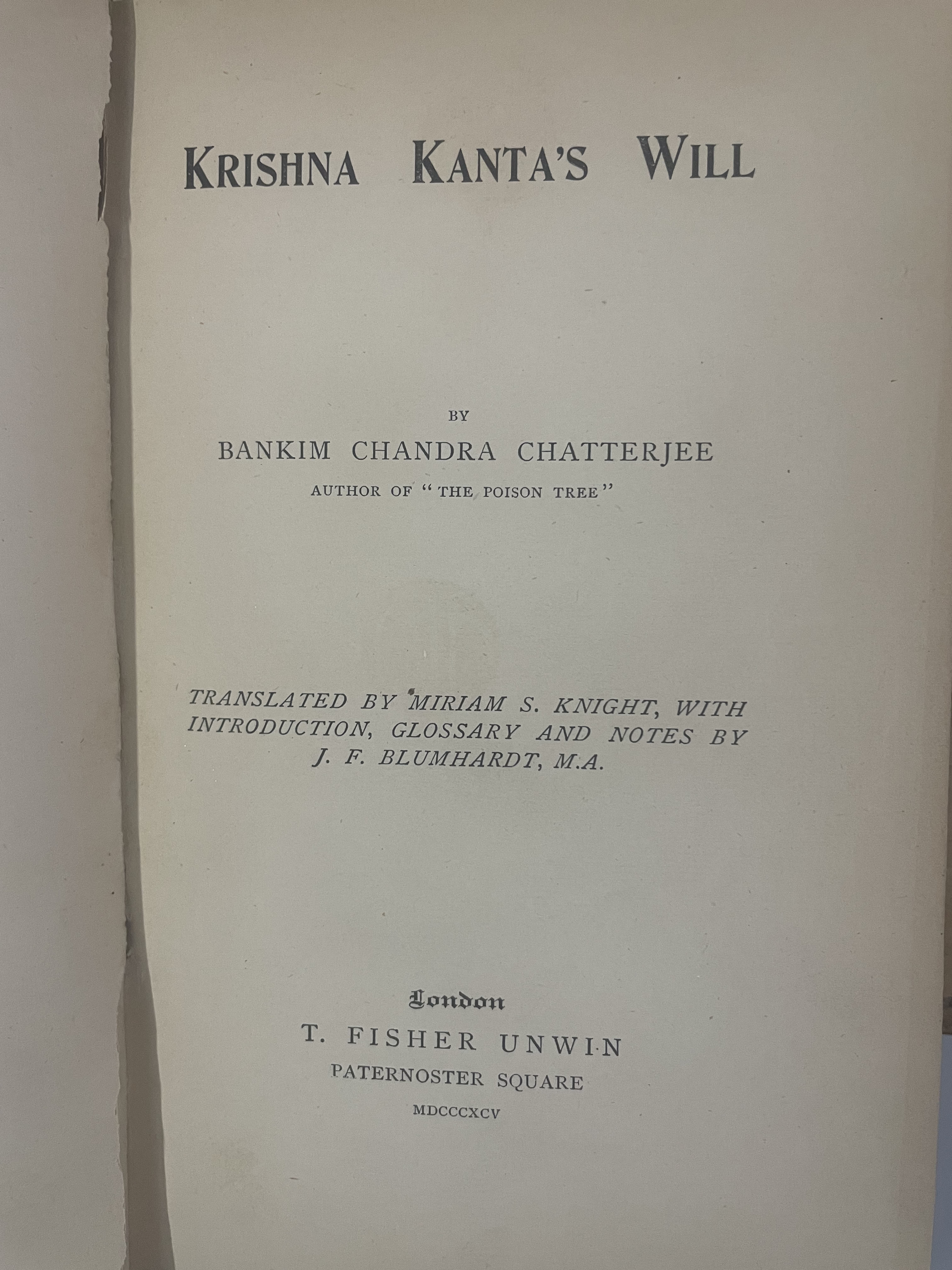Krishna Kantas Will

About
Summary
Exquisite
TOC
Details
Related
URL
Images
Overview
Krishna Kanta's Will (1878) by Bankim Chandra Chatterjee is a seminal work in Bengali literature that delves into complex social issues and timeless romantic themes. The novel explores widow remarriage, land ownership, and heredity within Hindu culture, set against the backdrop of a wealthy zamindar family.The story revolves around Krishna Kanta, the head of a rich zamindar family in Haridragram, whose estate generates an annual income of nearly two lakhs of rupees. The estate was jointly acquired by Krishna Kanta and his brother Ramkanta. Ramkanta dies before arranging a will to guarantee his son, Gobindalal, would inherit his portion of the property. Krishna Kanta, now the sole owner in legal terms, decides to draw up a will that allocates the property fairly. Half of the estate is bequeathed to Gobindalal, while the remaining half is divided among Krishna Kanta's two sons, his daughter, and his brother's widow.
This equitable division displeases Krishna Kanta's eldest son, Haralal, who confronts his father. In response to his son's challenge, Krishna Kanta disowns him. Outraged, Haralal hatches a plan to switch the will with a forged one, enlisting the help of Rohini, a seductive widow, to carry out the task. Rohini enters Krishna Kanta's bedroom to replace the will but is caught in the act. She admits her intentions but refuses to incriminate HaralalThe story revolves around Krishna Kanta, the head of a rich zamindar family in Haridragram, whose estate generates an annual income of nearly two lakhs of rupees. The estate was jointly acquired by Krishna Kanta and his brother Ramkanta. Ramkanta dies before arranging a will to guarantee his son, Gobindalal, would inherit his portion of the property. Krishna Kanta, now the sole owner in legal terms, decides to draw up a will that allocates the property fairly. Half of the estate is bequeathed to Gobindalal, while the remaining half is divided among Krishna Kanta's two sons, his daughter, and his brother's widow.
This equitable division displeases Krishna Kanta's eldest son, Haralal, who confronts his father. In response to his son's challenge, Krishna Kanta disowns him. Outraged, Haralal hatches a plan to switch the will with a forged one, enlisting the help of Rohini, a seductive widow, to carry out the task. Rohini enters Krishna Kanta's bedroom to replace the will but is caught in the act. She admits her intentions but refuses to incriminate Haralal.
Key Themes
Widowhood: The novel highlights the plight of widows in 19th-century Indian society, who were often ostracized and denied the right to remarry. By the time Krishnakanta’s Will was written (1878), the issue of a widow’s place in Indian society had been debated in the colonial metropolitan centres like Calcutta and Madras for almost a century.
Patriarchy: As head of the family, Krishnakanta makes the major decisions. The story portrays a patriarchal feudal society where the head of the family holds significant power and makes important decisions.
Land Ownership and Heredity: The story revolves around the inheritance of property and the complexities of land ownership in a feudal setting.
Justice and Fairness: Krishna Kanta's decision to divide his property fairly, despite societal norms and familial pressures, underscores the theme of justice.
Family Bonds: The importance of strong and supportive family relationships is a core theme. The story also shows how family bonds can be tested by greed and jealousy.
Love and Desire: The novel explores the complexities of love, desire, and betrayal, particularly through the relationships between Gobindalal, Bhramar, and Rohini.
Cultural Significance
Pioneering Work of Bengali Literature: Krishna Kanta's Will is recognized as a pioneering work of Bengali literature.
Social Commentary: The novel engages with pressing social issues of colonial Bengal, prompting discussions about widow remarriage and patriarchal structures.
Exploration of Hindu Culture: The story delves into aspects of Hindu culture, including traditions related to widowhood, land ownership, and heredity.
Character of Rohini: Rohini is considered an immortal character for her courage and principles, despite her low status in society. Rohini may be a young widow and a suffering woman, but she shows tremendous courage.
Realism: The novel is known for its realistic portrayal of characters and social situations.
Effects on Society
Influence on Social Reform: By addressing the issue of widowhood, the novel contributed to the ongoing debates about social reform in colonial India.
Reflection of Colonial Bengal: Krishnakanta's Will reverberates with burning and pressing issues of colonial Bengal which called for renaissance in India for the first time. The novel provides insights into the social and political landscape of colonial Bengal.
Promotion of Bengali Literature: As a significant work by Bankim Chandra Chatterjee, the novel has played a role in promoting Bengali literature and culture.
Discussion of Social Issues: The book encourages conversations and reflections on social issues such as widowhood, patriarchy, and the importance of justice and fairness.
Modern Interpretation of Hindu Texts: Bankim Chandra Chatterjee was a modern interpreter of Hindu religious texts
Conclusion
The novel explores the relationships between the characters, especially Gobindalal and his wife, Bhramar, and the attraction between Gobindalal and Rohini, which leads to suffering for all involved. The story culminates in tragedy, with Bhramar's death from a mysterious illness.
Title
Krishna Kantas Will
Author
Bankim Chandra Chatterjee
Name of Publisher
T Fisher Unwin
Publish Date
1895
Subject
Addresses social issues, family dynamics, and legal dilemmas in colonial Bengal
Vintage
1801-1900
Edition
First
Category
Literary
Sub Category
India
Rarity
RARE
